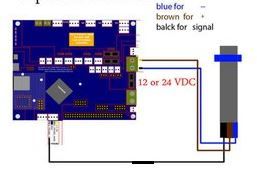Diode question on NPN NO level sensor
-
Please forgive my ignorance about diodes on this...
According to the wiki at https://duet3d.dozuki.com/Wiki/Connecting_a_Z_probe#Section_NPN_output_normally_open_inductive_or_capacitive_sensor it says to use a bat43, bat85 or 1N4148 diode but I've only been able to locate a UF4003 and 1N5821 from the shops that are open (quarantine FTW). Will either of these work/be safe for a duet 3 or should I wait until I get a 1N4148 in the mail?
-
You don't need to use a diode with Duet 3. It's only needed when using older hardware revisions of Duet WiFi/Ethernet.
-
That is fantastic! Just to confirm, I should be fine to wire the power and ground of the sensor to the 24V (directly to PS or maybe OUT_2) and the signal wire into the one of the IO headers (say IO_6).
-
And what about the Maestro. Can i connect the NPN Sensor directly on the Power + ground (24v) and the Signal on the Z-probe IN pin without any diode?
-
From wiki :
NPN output normally-open inductive or capacitive sensorDuet 2 Maestro, or revision 1.04 or later of Duet 2 WiFi or Duet 2 Ethernet: you can connect the output of the sensor directly to the Z-probe IN pin.
-
Yes, I read that too. But I am not sure if I understand that correctly. Can I connect the IN pin of the Z probe without a diode and load it with 24V? I don't want to damage the board.

-
@Bexter said in Diode question on NPN NO level sensor:
Yes, I read that too. But I am not sure if I understand that correctly. Can I connect the IN pin of the Z probe without a diode and load it with 24V? I don't want to damage the board.

Yes, if it's an NPN-output sensor. A PNP-output sensor required two resistors.
It's better to use an always-on fan output to provide power and ground to the sensor, so that the wiring is protected by the fuse on the Duet. Make sure you get the polarity right.
I've updated the text of that wiki page section to include Duet 3.
-
@dc42 Yes but the Maestro do not have any fuse.
-
@dc42 Thank you!